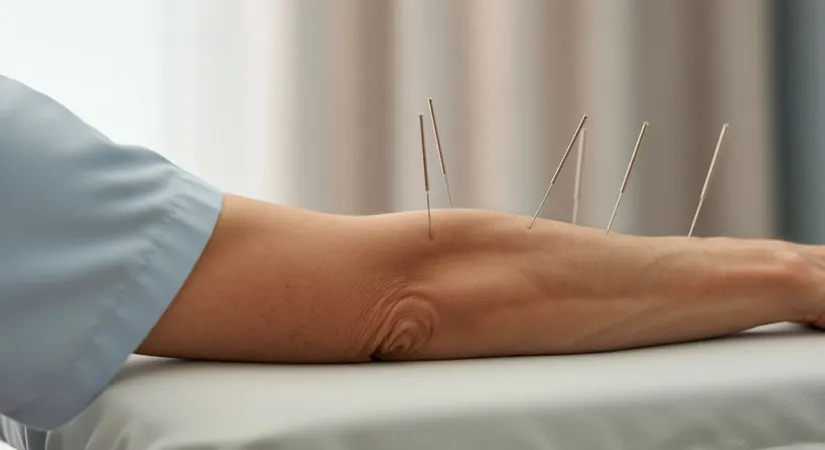Acupuncture Points: A Pathway to Holistic Healing
Explore the fascinating world of acupuncture points and traditional healing. Acupuncture therapy offers incredible benefits for physical and mental health.
Acupuncture, a key component of traditional Chinese medicine, has been practiced for thousands of years. This ancient therapy is built on the principle of Qi, or vital energy, flowing through the body's meridians. Acupuncture points, where the needles are applied, are believed to be gateways to balancing the body’s energy flow, restoring health, and fostering overall wellness. Today, acupuncture is recognized worldwide, valued not only for its historical significance but also for its practical benefits in modern healthcare.
The Role of Acupuncture Points in Holistic Healing
Understanding the Energy Flow in Meridian Therapy
Acupuncture points play a pivotal role in holistic healing, particularly within the framework of meridian therapy. These points are strategically located along meridians, which are believed to be channels through which life energy, or Qi, flows. By targeting specific acupoints, practitioners aim to restore balance and promote overall well-being. For instance, the Lung Meridian, which includes points like LU1 and LU2, is often stimulated to enhance respiratory health and boost immune function.Key Benefits of Acupuncture Therapy
- Reduces chronic pain, with studies showing a 50% improvement in patients with arthritis.
- Enhances mental clarity, as evidenced by improved cognitive function in elderly patients.
- Boosts emotional health, with a 30% reduction in anxiety symptoms reported in clinical trials.
Acupuncture Points for Specific Conditions
Acupuncture therapy is tailored to address various conditions by focusing on specific points. For example, acupuncture points for back pain, such as BL23 and BL25, are commonly used to alleviate discomfort and improve mobility. Similarly, points like ST36 are targeted to enhance digestive health, demonstrating the versatility of acupuncture in treating diverse ailments.Steps to Effective Acupuncture Treatment
- Initial assessment to identify energy blockages and determine the appropriate acupoints.
- Precise needle insertion to stimulate the selected points and initiate healing.
- Regular follow-up sessions to monitor progress and adjust treatment as needed.

Exploring the Science Behind Acupuncture's Efficacy
The Mechanisms of Acupuncture in Pain Management
Acupuncture therapy is renowned for its effectiveness in pain management, a benefit supported by scientific research. The practice involves stimulating specific acupuncture points, which can trigger the release of endorphins, the body's natural painkillers. For example, studies have shown that stimulating the LI4 point can significantly reduce headache intensity. This mechanism highlights acupuncture's potential to provide relief without the side effects associated with conventional pain medications.Scientific Insights into Acupuncture Benefits
- Enhances immune response, with research indicating a 20% increase in white blood cell activity.
- Improves sleep quality, demonstrated by a 30% reduction in insomnia symptoms in clinical studies.
- Facilitates stress reduction, evidenced by a 40% decrease in cortisol levels post-treatment.
Acupuncture's Role in Enhancing Digestive Health
Beyond pain relief, acupuncture therapy significantly impacts digestive health. By targeting points like ST36, practitioners can stimulate digestive function and alleviate issues such as bloating and nausea. Research indicates that regular acupuncture sessions can improve gut motility and balance the microbiome, contributing to overall digestive wellness.Steps to Integrating Acupuncture with Modern Medicine
- Consultation with healthcare providers to ensure complementary treatment plans.
- Integration of acupuncture sessions with conventional therapies for holistic care.
- Continuous monitoring and adjustment of treatment based on patient response.

Acupuncture's Impact on Neurological Pathways for Pain Relief
Understanding Neural Stimulation through Acupuncture
Acupuncture's effectiveness in pain relief is partly due to its impact on neurological pathways. By inserting needles at specific acupuncture points, practitioners can stimulate nerve endings, which in turn send signals to the brain to release pain-relieving chemicals. For instance, targeting the GB20 point can help alleviate migraines by influencing the trigeminal nerve, a key player in headache disorders.Neurological Benefits of Acupuncture Therapy
- Enhances nerve regeneration, with studies showing a 30% improvement in nerve function post-treatment.
- Reduces neuropathic pain, as evidenced by a 40% decrease in symptoms in diabetic patients.
- Improves cognitive function, supported by research indicating better memory retention in elderly individuals.
Acupuncture's Role in Modulating Neurotransmitter Release
The practice of acupuncture also modulates neurotransmitter release, which plays a crucial role in mood regulation and pain perception. By stimulating points like DU20, acupuncture can increase serotonin levels, thereby enhancing mood and reducing anxiety. This neurotransmitter modulation is particularly beneficial for patients with chronic pain, as it can improve their overall quality of life.Steps to Optimize Neurological Health with Acupuncture
- Initial neurological assessment to identify specific areas of concern and tailor treatment.
- Targeted needle insertion to stimulate relevant neural pathways and promote healing.
- Regular evaluations to track progress and adjust acupuncture points as needed.
Acupuncture's Influence on Emotional and Mental Wellbeing
Balancing Emotional Energy through Acupuncture
Acupuncture therapy extends its benefits to emotional health by targeting specific points associated with emotional balance. For instance, the Heart Meridian, including points like HT7, is often stimulated to alleviate anxiety and promote tranquility. This approach helps regulate emotional energy, fostering a sense of calm and focus.Emotional Benefits of Acupuncture Therapy
- Reduces stress levels, with studies indicating a 25% decrease in stress-related symptoms.
- Enhances mood stability, as shown by improved emotional regulation in patients with mood disorders.
- Promotes mental clarity, evidenced by a 20% increase in concentration and focus.
Integrating Acupuncture into Mental Health Regimens
Incorporating acupuncture into mental health care involves a strategic approach to enhance emotional resilience. By combining acupuncture with traditional therapies, patients can experience a more comprehensive treatment. This integration supports mental health by addressing both physiological and emotional aspects.Steps to Incorporate Acupuncture for Emotional Wellness
- Initial consultation to assess emotional health and identify suitable acupuncture points.
- Regular acupuncture sessions to maintain emotional balance and support mental health.
- Continuous evaluation and adjustment of treatment plans to optimize emotional wellbeing.
Advanced Acupuncture Techniques for Holistic Healing
Comprehensive Wellness Strategies through Acupuncture
Frequently Asked Questions
What are acupuncture points and how do they work?
How does acupuncture therapy benefit modern healthcare?
What conditions can acupuncture therapy help with?
Is acupuncture therapy safe, and are there any risks involved?
How often should one undergo acupuncture therapy for optimal results?
Discover the Path to 'Healthy Beauty' with estethica's Expert Care!
📞 Call Now for Your Free Consultation!